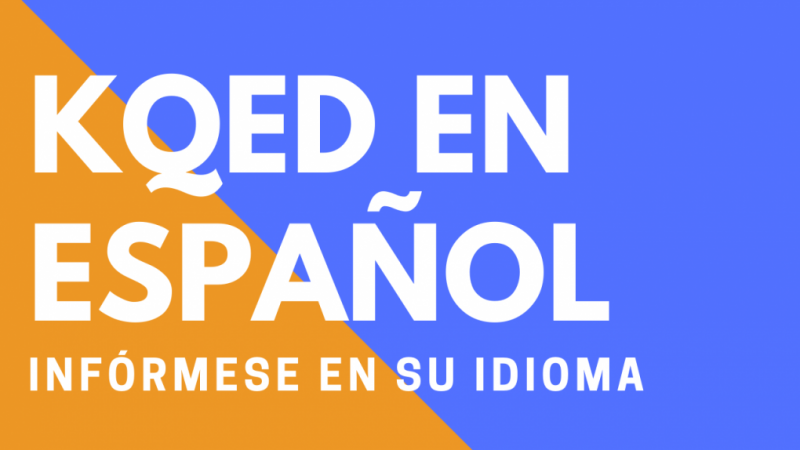Nota del editor: Está leyendo el archivo de nuestro boletín bilingüe del 24 de septiembre de 2020. Suscribáse al boletín semanal de KQED en Español en este enlace.
El término 'Americano de primera generación' conlleva tener muchas "primeras" experiencias, como interpretarle a los miembros de tu familia, aplicar a la universidad, y negociar salarios. Para mí, también incluyó ser la primera en buscar y quedarme en terapia, aún cuando mi vida se veía perfecta. Encontré a mi primera terapeuta por medio del directorio de Latinx Therapy.
Trabajo en un podcast de consejos llamado Truth Be Told y mandé mi propia pregunta para un episodio en el cual conocí a la fundadora del directorio, Adriana Alejandre. Ella me ayudó a contestar mi pregunta: '¿Cómo empiezo a sanar después de la deportación de mi padre?' Entonces confié en su directorio para encontrar a alguien que me podría ayudar a encontrar paz. Esa ha sido la meta de mi terapia hasta este momento; encontrar esa paz interior sin importar las decisiones de aquellos a mi alrededor. Esto incluye a mis seres queridos, colegas y políticos.
Sé muy bien el privilegio que significa el tener tiempo para enfocarme en mi estado emocional en lugar de los problemas del día a día. Pero también quería compartir ese privilegio a mi madre que nunca la he visto descansar, trabajar con sus emociones o tener a alguien con quien platicar constantemente. Hace aproximadamente un año, su mamá, mi abuelita, falleció de cáncer cerebral. Mi abuelita ayudó a criarnos y vivía con nosotros así que fuimos sus cuidadores durante sus últimos años de vida.
Cuando falleció y mi mamá no podía llorar, aceptó mi oferta de encontrarle un terapeuta. Llamé a Medicaid y pedí una lista de terapeutas que le dieron que hablaran español. Le pregunté a mi mamá que le gustaría hablar con su terapeuta para buscarle uno con esas características. Me enteré, después de unas cuantas sesiones, que su terapeuta no hablaba español fluido. Entonces le encontré uno nuevo, la meta de mi mamá ha sido reconocer y sentir sus emociones.
Honestamente, encontrar un terapeuta no debería de ser tan difícil y es complicado entender el proceso por uno mismo. Superar el estigma y los tabúes de la salud mental no significa que el camino es más fácil. Siempre existe el miedo, nerviosismo y la incomodidad en confiar en un desconocido. Pero no estás solo. Sin embargo, quiero enfatizar que si sientes que algo no está bien — emocionalmente, mentalmente, espiritualmente — estás en lo correcto. Tú conoces tu mente, tu cuerpo y tu corazón mejor que nadie, así que confía en ti. Si estás abierto a recibir ayuda, hay recursos para ayudar a hacer ese proceso más sencillo para ti.
Tips en como encontrar un terapeuta que me funcionaron a mi:
- Haz una lista de características que necesitas que tenga tu terapeuta: edad, idioma, raza/etnicidad, inmigrante de primera generación y género.
- Si tienes aseguranza, llama y pregunta por los terapeutas cerca de tu área o terapeutas que están aceptando a nuevos pacientes para sesiones por teléfono o en línea. Debido al coronavirus, muchos terapeutas están disponibles para atender a nuevos clientes cerca o lejos.
- Puede ser que tu aseguranza te pregunte cuales son tus preferencias. Si te sientes cómodo, compártelas, y si no, llama a cada persona en la lista para ver si es la persona adecuada para ti.
- Si no tienes aseguranza, hay directorios como Latinx Therapy, Therapy for Latinx o Open Path Collective donde puedes encontrar terapeutas. Si aún tiene problemas financieros, le puedes preguntar a tus seres queridos si pueden patrocinar sesiones, en forma de un regalo de cumpleaños o un regalo de navidad. Cuando trabajaba por mi cuenta, yo le decía a mis terapeutas que solo me alcanzaba para pagar de $20 a $50 y algunos decían que estaba bien. Así que no dejes que el dinero sea un obstáculo para obtener la ayuda que necesitas.
- Busca las redes sociales y páginas web de los terapeutas para encontrar más información sobre ellos y que tipo de terapeutas son.
- Cuando hables con terapeutas, es muy probable que vaya a necesitar hacer una cita gratis de 15 minutos para conocerlos y compartir lo que estás buscando. Algunas cosas importantes que se deben mencionar es por qué estás nervioso sobre el proceso de terapia, si es tu primera vez, qué ayuda necesitas y cuáles son tus preferencias. Pregunta cómo es una sesión normalmente con ellos. Ese es el tiempo en donde tú los puedes entrevistar a ellos. Tú (o tu aseguranza) les vas a pagar, y si no es la persona para ti, no pasa nada. No te conformes con una persona que no te haga sentir bien. El proceso es muy parecido al tratar de encontrar a una pareja.
- Es importante saber la disponibilidad de ambos. La terapia tiene que acomodarse con tu horario y tienden a ser emocionales, así que no quieres tener terapia en medio de un día de trabajo ocupado o cuando no vas a tener privacidad en tu casa. Pregunta si puedes tomar unos 2 o 3 días para decidir por cuál terapeuta quieres. Tal vez te pregunten tu decisión al final de la entrevista de 15 minutos pero no te sientas presionado para contestar.
- Pregunta si puedes tomarte algunos días o incluso una semana para darles una respuesta. Hablar con un amigo cercano sobre las opciones para tu terapeuta puede ayudarte con tu decisión. ¿Te sentiste cómodo platicando con la persona? Sé honesto en tu reflexión.
- Si tienes más preguntas después de tu llamada, contáctalos para que te contesten tus preguntas antes de que tomes una decisión. Si terminas yendo a tu primera sesión y no te gustó, también está bien. Puedes volver a revisar la lista de los terapeutas.
- Busca con tranquilidad porque cuesta dinero y energía encontrar a la persona correcta. Lo más importante es estar orgulloso contigo mismo por tomar los primeros pasos para convertirte en la mejor versión de ti.
Puedes mandarme un correo a imendoza@kqed.org si tienes alguna pregunta o sígueme en Twitter.
Mientras tanto, estaré trabajando en encontrar mi paz interior.
The term first generation American usually comes with experiencing "firsts" like translating for family members, applying to college, and negotiating salaries. For me, it also included being the first to seek therapy and stay in therapy even when life felt good. I found my current therapist through the Latinx Therapy directory.
I work on an advice podcast called Truth Be Told and submitted my own question for an episode which is where I met the founder of the directory, Adriana Alejandre. She helped me answer the question, 'how do I begin to heal after my dad's deportation?' So, I trusted her network to find someone who can continue helping me trying to find peace. That has been my goal in therapy so far — finding inner peace no matter the decisions taken by those around me. This includes loved ones, co-workers, and politicians.
I know very well the privilege it is to have the time to focus on my emotional health versus daily survival. So, I also wanted to extend this privilege to my mom who I never see rest, work through her emotions or have someone she can talk to consistently. About a year ago, her mom and my abuelita, passed away from brain cancer. My abuelita helped raise us and lived with us so we were her caregivers in her final months.
When she passed and my mom couldn't cry, she accepted my offer of finding her a therapist. I called Medicaid and the list of therapists they gave her that spoke Spanish. I asked my mom what she would like to explore with a therapist and interviewed them based on that. I found after a few sessions that her first therapist did not speak Spanish fluently. So, we found her a new one and my moms goal has been to recognize and feel her emotions.
Honestly, finding a therapist shouldn't be as hard as it’s set up to be and it’s hard to figure it out alone. Getting past the stigma and taboo of mental health doesn't mean the journey will get easier. There are always feelings of fear, nervousness and being uncomfortable trusting a complete stranger. You are not alone in that. But I do want to emphasize that if you feel something is off — emotionally, mentally, spiritually — you're right about that. You know your mind, body and heart the best, so trust yourself. If you are open to getting help, there are resources that try to make the process easier.
Tips on finding a therapist that have helped me:
-
- Make a list of the characteristics you need your therapist to have: age, language, race/ethnicity, first-generation, gender and so forth.
- If you have insurance, call and ask for the therapists near your area or therapists that are taking new patients for phone/online sessions. Due to COVID, many therapists are opening up to take new clients near and far. Your insurance may ask you what your preferences from #1 are. If you feel comfortable, share them, and if not, you will have to call each person on the list and see if they fit them.
- If you don't have insurance there are directories like Latinx Therapy, Therapy for Latinx or Open Path Collective where you can ask to pay what you can. If you still have financial obstacles, you can ask loved ones to sponsor sessions, make it a birthday gift or holiday gift. When I was self-employed, I told therapists I could only afford to pay $20-$50 and some said that was okay with them. So don’t let money be an issue in getting the support you need.
- Look up therapists on social media and their websites to get more information about them and what kinds of therapies they do. When you call therapists, you will most likely have to make a free 15-min appointment to get to know them and share what you are looking for. Some important things to say are what you are nervous about in the therapy process, if it's your first time, what you’re needing support with and your preferences. Ask, what a typical session looks like with them. This is the time for you to interview them. You (or your insurance) will be paying them, so if they’re not a good fit, it’s no problem. Don't settle for someone who you don’t feel excited about. It’s a lot like dating.
- It is also important to know what availability they have in their schedules. Therapy sessions also need to work with your schedule and they may be emotional, so you don’t want to schedule them in between a busy work day or when you won’t have privacy at home. Ask for 2-3 days to think about who you want to choose. They may ask you at the end of 15-min to decide, but you don’t need to feel pressured.
- Ask for a few days or even a week to give them an answer. It may be helpful to talk with a trusted friend about your therapist options. Did you feel comfortable when talking to them? Be honest in your reflection.
- If you have more questions after your call, contact them so you can get the answers you need before making your decision. If you end up going to your first session and aren’t feeling it, that’s okay too. You can go back to your list of therapists.
- Pace yourself in searching because it does take a lot of energy to find someone that fits you. Most importantly, be proud of yourself for taking the first steps in helping you become the best version of you.
Feel free to email me at imendoza@kqed.org with any questions or follow me on Twitter.
In the meantime, I will be working on finding inner-peace.
In community,
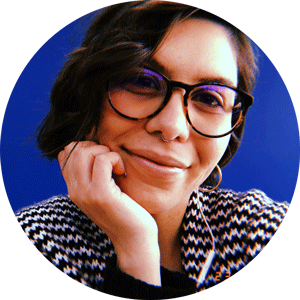
Isabeth Mendoza
Productora de/Producer for Truth be Told
(she/her/ella)
NOTICIAS | NEWS

Aquí las noticias más recientes para usted:
- Recursos para cuidar su salud mental durante la situación actual — La calidad del aire ha mejorado en nuestra zona pero aún así, muchos de nosotros seguimos enfrentando una gran cantidad de presión y ansiedad. Hemos recopilado una lista de nuestras publicaciones que lo pueden ayudar a manejar tanto estrés. Leer más
- Covid-19 hace más difícil encontrar y reunir a familias migrantes separadas — Grupos de defensores de migrantes reanudan la búsqueda de padres separados de sus hijos en la frontera entre México y EEUU. Pero la pandemia ha complicado este esfuerzo. Leer más
- ¿Cuándo debe vacunarse contra la gripe? Ya llegó el otoño, y con ello la temporada de la influenza, o gripe. ¿Qué relación tiene esta vacuna con el COVID-19? ¿Quiénes deben esperarse un poco antes de recibir la vacuna? Hablamos con Dr. Peter Chin-Hong de UCSF para resolver estas dudas. Leer más
Here are our recent stories that we think matter to you:
- It Was Already Hard, Then it Got Worse: Resources for Coping Right Now — Even before wildfires devastated large parts of our home state, we were all dealing with a lot. We compiled a list of some of our publications that could help you manage so much pressure. Read more
- How COVID-19 Has Impacted the Search for Separated Families — Migrant advocacy groups have restarted their search for parents separated from their children at the US-Mexico border. But the pandemic has made this quest even more complicated. Read more
- When Should You Get Your Flu Shot? Autumn is here and with that is also the start of flu season. Does the flu vaccine impact COVID-19? Who should wait a bit before getting a flu shot? We talk to Dr. Peter Chin-Hong from UCSF to answer these questions. Read more
DE NUESTRA COMUNIDAD | OUR COMMUNITY
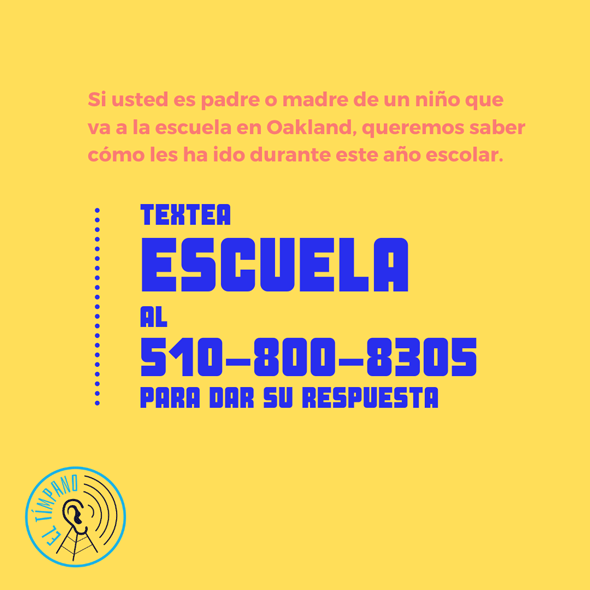
¿Sus hijos asisten a escuelas en Oakland? 📚
Estamos colaborando con El Tímpano y The Oaklanside en un proyecto y queremos escuchar a los padres de familia y sus experiencias durante el ciclo escolar mientras continúa la pandemia de covid-19.
🗣️ Comparta con otros padres de familia 🗣️
Does your child attend school in Oakland? 📚
We’re collaborating with El Tímpano and The Oaklandside on an upcoming project and want to hear from parents about their experiences of schooling as the COVID-19 pandemic continues.
🗣️ Share this with the parents you know 🗣️
RECURSOS | RESOURCES
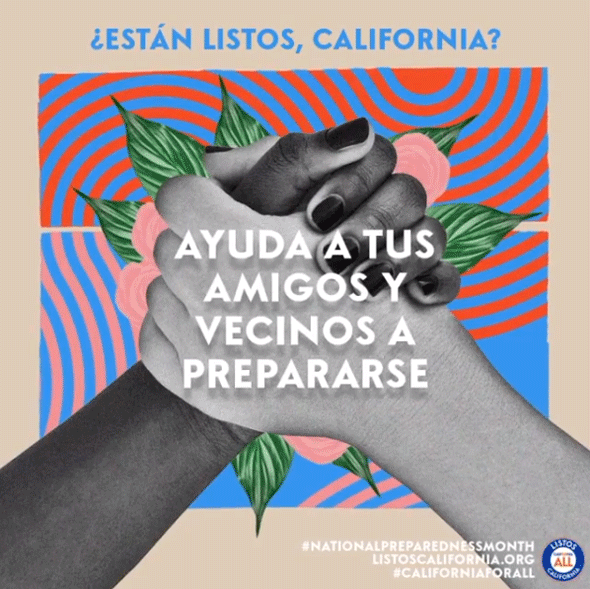
Aquí se encuentran algunas recursos para el bienestar de usted y de los demás:
- Long Beach ofrece pruebas de covid-19 gratuitas. Por medio de un sitio de pruebas móvil, se ofrecerán pruebas gratuitas en diferentes partes de la ciudad cada semana. El servicio se ofrece en español. Leer más
- Prepárense para una emergencia porque la información es poder. Textea LISTOSCA a 72345 y recibe un mensaje de texto por día, enviado a la hora que elijas, en el transcurso de una semana. Leer más
Here you’ll find resources for your well-being and that of others:
- Long Beach opens free mobile COVID-19 testing sites. The Southern California city started offering free COVID-19 tests through their mobile testing site which will have pop ups every week in different parts of the city. Read more
- Get ready for an emergency because information is power. Text LISTOSCA to 72345 and receive a text message a day, sent at a time you choose during the week. Read more
TALK TO US | HÁBLANOS
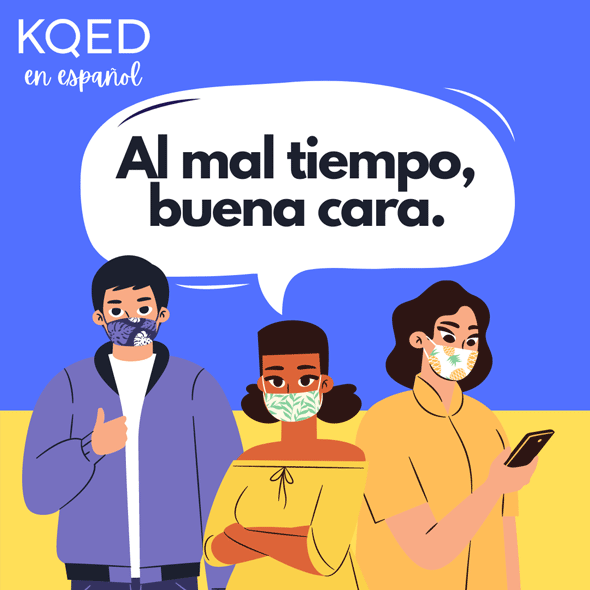
Nuestras historias en nuestras voces. KQED en Español ya está en Instagram! Les brindamos noticias, consejitos y comunidad para la comunidad Latinx del Área de la Bahía y más allá. ¡Síganos!
Our stories in our voices. KQED en Español is now on Instagram! We’ll bring you news, advice and community for our Latinx community in the Bay Area and beyond. Follow us!
Manténgase informado con las noticias de KQED en Español. Suscríbase a nuestro boletín bilingüe ➡ kqed.org/kqedenespanol
